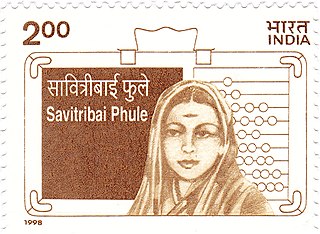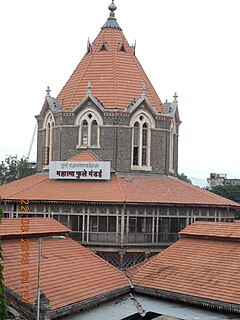
Pune, also known as Poona, is one of the most important industrial and educational hubs of India, with an estimated population of 7.4 million as of 2020. Pune is considered to be the cultural and educational capital of Maharashtra state. It has been ranked "the most liveable city in India" several times. Together with the municipal corporation areas of Pimpri-Chinchwad (PCMC) and Pune (PMC), and the three cantonment towns of Camp, Khadki, and Dehu Road, Pune forms the urban core of the eponymous Pune Metropolitan Region (PMR). As of 2021, with an area of 7,256 sq km, PMR is geographically the largest metropolitan region in Maharashtra state and 5th largest in India.

Ahmednagar, is a city located in the Ahmednagar district in the state of Maharashtra, India, about 120 km northeast of Pune and 114 km from Aurangabad. Ahmednagar takes its name from Ahmad Nizam Shah I, who founded the town in 1494 on the site of a battlefield where he won a battle against superior Bahamani forces. It was close to the site of the village of Bhingar. With the breakup of the Bahmani Sultanate, Ahmad established a new sultanate in Ahmednagar, also known as Nizam Shahi dynasty.

Jyotirao Phule, also known as Mahatma Jyotiba Phule was an Indian social activist, thinker, anti-caste social reformer and writer from Maharashtra. His work extended to many fields, including eradication of untouchability and the caste system and for his efforts in educating women and oppressed caste people. He and his wife, Savitribai Phule, were pioneers of women's education in India. Phule started his first school for girls in 1848 in Pune at Tatyasaheb Bhide's residence or Bhidewada. He, along with his followers, formed the Satyashodhak Samaj to attain equal rights for people from lower castes. People from all religions and castes could become a part of this association which worked for the upliftment of the oppressed classes. Phule is regarded as an important figure in the social reform movement in Maharashtra. He was bestowed with honorific Mahātmā title by Maharashtrian social activist Vithalrao Krishnaji Vandekar in 1888.

Savitribai Phule Pune University (SPPU), formerly the University of Poona, is a collegiate public state university located in the city of Pune, India. It was established in 1949, and is spread over a 411 acres (1.66 km2) campus in the neighbourhood of Ganeshkhind. The university houses 46 academic departments. It has about 307 recognized research institutes and 612 affiliated colleges offering graduate and under-graduate courses. Savitribai Phule Pune University Ranked 12th NIRF Ranking in 2022

Prahlad Keshav Atre, popularly known as Āchārya Atre, was a prominent Marathi writer, poet, educationist, founder–editor of Maratha, and above all, a noted orator.
Baramatipronunciation (help·info) ([baːɾamət̪iː]) is a city, a tehsil and a municipal council in Pune district in the state of Maharashtra, India. The city is about 100 KM southeast of the city of Pune and about 250 KM from Mumbai.

Pune district is the most populous district in the Indian state of Maharashtra. The district's population was 9,429,408 in the 2011 census, making it the fourth most populous district amongst India's 640 districts. This district has an urban population of 58.08 percent of its total. It is one of the most industrialized districts in India. In recent decades it has also become a hub for information technology.

Savitribai Jyotirao Phule was an Indian social reformer, educationalist, and poet from Maharashtra. Along with her husband, in Maharashtra, she played an important and vital role in improving women's rights in India. She is considered to be the pioneer of India's feminist movement. Savitribai and her husband founded one of the first modern Indian girls' school in Pune, at Bhide wada in 1848. She worked to abolish the discrimination and unfair treatment of people based on caste and gender. She is regarded as an important figure of the social reform movement in Maharashtra.
Ambemohar is a fragrant rice variant grown in the foothills of the Western ghats region of the state of Maharashtra in India.

Satyashodhak Samaj was a social reform society founded by Jyotiba Phule in Pune, Maharashtra, on 24 September 1873. It espoused a mission of education and increased social rights and political access for underprivileged groups, focused especially on women, peasants, and Dalits, in Maharashtra. Jyotirao's wife Savitribai was the head of women's section of the society. The Samaj disbanded during the 1930s as leaders left to join the Indian National Congress party.
Pune is the 9th most populous city in India and one of the largest in the state of Maharashtra. The history of the city is closely related to the rise of the Maratha empire from the 17th–18th century. During the 18th century, Pune became the political centre of the Indian subcontinent; as the seat of the Peshwas, who were the prime ministers of the Maratha Empire.
Shivajinagar is an suburb of the city of Pune, India.

Dhananjay Ramchandra Gadgil, also known as D. R. Gadgil, was an Indian economist, institution builder and the vice-chairman of the Planning Commission of India. He was the founder Director of the Gokhale Institute of Politics and Economics, Pune and the author of the Gadgil formula, which served as the base for the allocation of central assistance to states during the Fourth and Fifth Five Year Plans of India. He is credited with contributions towards the development of Farmers' Cooperative movement in Maharashtra. The Government of India recognised his services by issuing a commemorative postage stamp in his honour in 2008.

Mahathma Phule Mandai is the biggest retail vegetable market in the city of Pune, India. The market is housed in an iconic building from the British colonial era in the Shukrawar Peth locality in the center of the city.
Modern education was introduced to Maharashtra region during the 19th century by British colonial administration. Census of 2011 showed literacy rates in the state for males and females were around 78% and 67% respectively. Education at different levels in the state is provided by the state, government supported charities, or private institutions. There are also a number of institutes offering vocational training.
Bhushan Patwardhan is a Professor of Health Sciences, biomedical scientist, and ethnopharmacologist. He serves as the chairman of the Interdisciplinary AYUSH R&D Task Force on COVID-19. Until March 4, 2021, Patwardhan served as the Vice Chairman of the University Grants Commission, New Delhi, and Chairman of the Indian Council of Social Science Research.
Atmaram Bhairav Joshi was an Indian agricultural scientist and academic, known for his contributions to the field of wheat and other crop breeding. He was the vice-chancellor of Mahatma Phule Krishi Viswavidyalaya, Rahuri and the chairman of the Research Advisory Committee of the Indian Agricultural Research Institute, New Delhi. The Government of India awarded him the fourth highest Indian civilian award of Padma Shri in 1975.

The College of Agriculture, Pune is a college for studies and research in the field of Agriculture situated in Pune, India. It is constituent college of Mahatma Phule Krishi Vidyapeeth.













